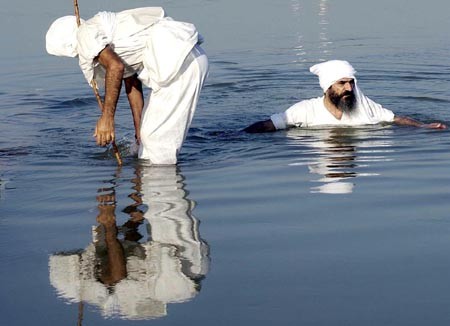FOLLOWERS OF JOHN THE BAPTIST
Iraq: Climate change also threatens religious diversityThe case of the Sabei and Mandei, whose lives are linked to the course of rivers: their survival in the country is at risk. A demographic imbalance risks triggering social and political chaos, fuelling conflicts. The role of Turkey and Iran in the exploitation of rivers. The process of desertification has reached 70% of Iraqi territory.

Baghdad (AsiaNews) - Drought, sandstorms, a crisis in the agricultural sector: climate change is hitting Iraq particularly hard, a nation where the process of desertification has now reached 70% of the territory.
However, global warming is also having an impact on the demographic balance and distribution of the Arab country's population, especially the Sabeans and Mandaeans whose lives are closely linked to the course of the rivers, who are increasingly forced to migrate internally or flee abroad, substantially - and perhaps irreversibly - changing their population.
Several Iraqi government agencies have recently raised the alarm against this further threat linked to the global change (and overheating) of climate and temperatures, which have never been so high, resulting in rivers drying up, lack of rain and dust storms.
The United Nations Development Programme (UNDP) notes that 'rising temperatures, low rainfall, salinity, successive sand and dust storms' are 'challenges' facing the country that will 'adversely affect food supplies, water, social security and health'.
There are several factors at play, not least of which is the demographics of a nation made up of different ethnic groups and religions, often at odds with each other. Desertification and rising temperatures have pushed several communities to abandon rural areas and move to urban centres, because the fields have become parched and unusable for sowing and harvesting.
This is a paradox for ancient Mesopotamia, considered in the distant past the 'fertile crescent' thanks to the course of its two main rivers: the Tigris and the Euphrates.
Those who suffer most from the upheavals are the weaker sections of the population, particularly the Sabeans and Mandeans, who have already been subjected to persecution and violence in recent decades. These two communities, in fact, are famous for celebrating rituals - above all baptism, which holds great significance and is a pillar of worship and entry into the community - along the banks of rivers.
Sabei and Mandei, the experts explain, are closely connected to rivers, their rituals are celebrated and are linked to fresh water, but they are continually regressing to the point of forcing populations to migrate.
The emergency also extends to the marshy areas in southern Iraq, which are considered among the most important for habitat and biodiversity in all of western Asia (and the Middle East), as well as being a Unesco World Heritage Site.
The experts are therefore appealing to government authorities to take action to deal with an emergency that is as much a climate emergency as it is a demographic, environmental and social one, as well as having a strong impact on the economy.
At the same time, there is also an appeal to the communities themselves, starting with the Sabeans and Mandeans, who will be the first to find forms of 'adaptation' to an evolving reality, to seek new inland areas that are suitable for relocation, safeguarding as much as possible their cults and traditions.
On the international front, there is finally a call to neighbouring nations such as Turkey and Iran whose policies strongly affect Iraq's water resources.
Pressure and intervention are needed on the governments of Tehran (which is also grappling with a 'water war' with Afghanistan) and Ankara to increase the release of water and stop the construction of new dams, now dozens of which are scattered along the course of the rivers, without taking into account the balance between different needs.
After all, the demographic balance is functional to the political and social balance; its disruption will end up generating - or fuelling - chaos in the region, with further wars and migrations.
No comments:
Post a Comment